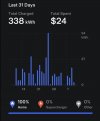- Joined
- May 15, 2017
- Messages
- 7,589
- Reaction score
- 19,532
Hi, if you are EV curious, feel free to ask me stuff. I have owned one for the last almost-four years now and have used it for road trips and daily driver. I have two friends who have owned them or own them, have given countless test drives and been responsible for some buying them.
I do not argue the environmental benefits. Those are well researched already, and it's quite clear, but I don't think it's a good argument for most folks. It's very abstract, and if you are willing to bend for the environmental argument, you are likely not needing to ask questions
I do not argue the environmental benefits. Those are well researched already, and it's quite clear, but I don't think it's a good argument for most folks. It's very abstract, and if you are willing to bend for the environmental argument, you are likely not needing to ask questions








 ) it still seems an odd exclusion. Supposedly Honda is considering a hybrid Ridgeline, which for that market will probably sell well. I use my truck as a truck too much to consider anything less than a 6-1/2' bed but I miss my Tacoma's 26mpg, the Tundra is a really nice truck but it sure does like the gas.
) it still seems an odd exclusion. Supposedly Honda is considering a hybrid Ridgeline, which for that market will probably sell well. I use my truck as a truck too much to consider anything less than a 6-1/2' bed but I miss my Tacoma's 26mpg, the Tundra is a really nice truck but it sure does like the gas.

